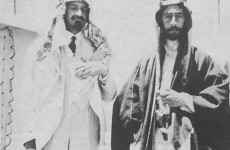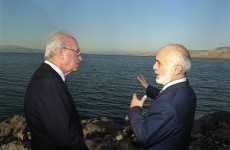
Israel has again marked the Hebrew date of former Prime Minister Yitzhak Rabin’s assassination. He was shot in the back by Righ-wink fanatic Yigal Amir after he had addressed a huge peace rally in Tel Aviv on the night of November 4th, 1995.
The question is often asked, what if Rabin had not been murdered? Would the Jewish state now be living in peace with the Palestinians and the rest of the Arab world? Rabin himself signed on to peace with Jordan’s King Hussein, following in the footsteps of Menachem Begin’s monumental accord with Egypt Anwar Saadat. Since Rabin’s assassination, and most recently, three more Arab states – The United Arab Emirates, Bahrain, and Sudan have also made peace with the Jewish state, led by Bibi Netanyahu.
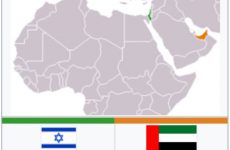
Lebanon has also decided to engage in contact in order to finalize the marine border with Israel – a step that just might further-open the door eventually between Beirut and Jerusalem. This despite the opposition of Hezbollah, an Iranian proxy, that heats up the border from time to time. Saudi Arabia, now threatened and openly attacked by Iran, is also a prospective peace partner. As for Syria, it’s a basketcase pervaded by Iranian forces trying hard to establish a Hezbollah-like military presence along Israel’s border.
So, peace seems to be breaking out all over the place except for the people who matter most -Israel’s closest Palestinian neighbors in the West Bank and Gaza Strip. But while there are significant shifts for Israel among its Arab neighbors, what’s happening in the Palestinian camp? This IsraCast analysis, dated October 30th, 2015, still applies to this very day.
WHAT IF YITZHAK RABIN HAD NOT BEEN ASSASSINATED?
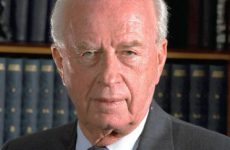
What if the Israeli Prime Minister had not been assassinated after that peace rally on Nov.15th, 1995? Would Israel now be living at peace with the state of Palestine on the West Bank and the Gaza Strip? Did Yigal Amir, the Right Wing Israeli killer, change the course of history?
Of course, there is no way of knowing. But it is possible to examine what has happened since that cursed night. Today over 90% of Israelis can tell you exactly what they were doing when they heard the news. A night when Israel’s vaunted Shabak Security Service failed abysmally to prevent the assassin, armed with a revolver, from casually walking up and firing three shots into Rabin’s back while a couple of his body-guards looked on in disbelief – Jews aren’t supposed to assassinate their leaders! (The bullets were hollow-point to increase the damage and Rabin never had a chance.
The background…
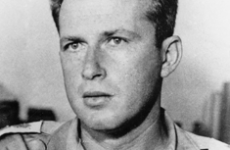
Since Prime Minister Rabin had signed the Oslo Peace Accord in Washington with PLO chairman, Yasser Arafat, Israeli politics had turned very ugly and violent. There were already several incidents where critics cursed Rabin and even threatened him at public gatherings. Oslo had envisaged a two-state solution with the establishment of Palestine after a five-year period. The Israeli leader held that this ‘separation’ would entail the withdrawal from almost all the West Bank and the Gaza Strip.
Some Right-wingers, but not the political leaders, were branding Rabin a traitor. This chorus reached a crescendo at a Likud rally in Jerusalem’s Zion Square when some extremists displayed a big caricature of Rabin dressed in a Nazi SS uniform. This is not to say that Netanyahu and Sharon condoned the disgusting deed; later they said they hadn’t seen it.
The writing should have been on the wall, but the Shabak apparently didn’t see it. Political assassination in Israel was not considered to be a clear and present danger. Rabin himself refused to wear a bulletproof vest. “Jews don’t kill their political leaders – it’s not done!” Besides this was a Jewish peace rally. Shabak director Carmi Gillon was even out of the country at the time, an indication that he was not overly concerned about the possibility of a political attack. Gillon later said he was surprised that one of Rabin’s bodyguards had not reacted more swiftly, and allowed Amir to fire off three shots and then be taken into custody unharmed.
At the time, I was a political correspondent for Israel’s Channel 1 English News. Growing up in Canada, I was acquainted with the ideology of Rabbi Meir Kahane’s Defense League in the U.S. Perhaps I might have even taken pride in how Jews stood up to anti-Semites in American cities. But I was also aware of the violent streak that ran through this ideology.
I had arranged a TV interview with Kahane at his Jerusalem headquarters in the Machaneh Yehuda neighborhood. My TV crew was not delighted with the idea, as his supporters were known to be hostile to the media, so we took along an armed bodyguard from the TV station. When we got to Kahane’s headquarters, my crew would not go inside the building unless we were escorted by one of Kahane’s guys. I went inside and got one to accompany us to Kahane’s office. He himself received me cordially enough. What I remember is that after Kahane’s hateful diatribe about Arabs and Israeli Left-wingers, whom he viewed as virtual traitors, I asked him:
“What about democracy and the rule of law and the majority?”
This riled Kahane and he shot back:
“What are you talking about?! Democracy comes from the Greeks – it’s not Jewish! We have our Torah – this is our democracy! This is what we must live by!”
Although Yigal Amir was not a member of Kahane’s Kach party, which was banned in Israel, this was the ideology that spawned the assassin. Today it also apparently what drives a young Kahane relative, who is now under administrative arrest in Israel.

While we were leaving, we were met by a very unpleasant surprise – someone sprayed some liquid into the face of our bodyguard, who yelled and writhed in pain from his stinging eyes. It turned out to be vinegar, and after a washing with water, it caused no damage. I was profoundly shocked on two different levels: First, Kahane’s total rejection of democratic principles, and secondly, the nasty attack, although there was no proof that Kahane’s people had done it.
At another event, some protestors displayed a coffin when Rabin walked by. The message was clear. Another time, Labor cabinet minister Binyamin Ben-Eliezer was prevented from driving to the Knesset when a mob blocked the way of his car for some time. They banged on the vehicle with their fists and chanted insults at him. Some even started rocking the vehicle from side to side as if to overturn it with him and his driver inside. The police had to rescue them and escort them to the Knesset. Arriving inside, the shocked cabinet minister told his colleagues:
“This is going to end very badly!”
Like everyone else of my generation, I was shocked to the core by the assassination of President John Kennedy. I began to take the political situation that I was covering very seriously. At one point, I even confided to my wife Nili that I was concerned that a Kennedy assassination could be perpetrated in Israel. Look, these Kahane people come from America! I even considered a list of Left-wing politicians who might be on some crazy’s hit list: Yitzhak Rabin, Shimon Peres, Shulamit Aloni, and Yossi Sarid.
My wife discarded Shulamit Aloni because she was a woman and wouldn’t be taken seriously enough by Jewish religious fanatics. I did not convey my concern to anyone else for fear they would consider me to be a crackpot alarmist. Besides, the Shabak was considered to be a super security service – they must have professional psychologists who study such situations, including the Kennedy assassination. Alas, it was to happen in Israel, and even the vast majority of Rabin’s critics could only weep and wonder.
Responding to tragedy…
Labor’s Shimon Peres was next in line for PM. Consider this: compared to ‘break their bones’ Rabin, Peres was the ultimate dove. He would be an eager leader bent on working with Arafat on forging the two-state solution after the current vortex subsided. Meanwhile, a wave of rage and revulsion swept Israel. It was directed at the Right-wing in general, and the Likud party in particular.
It would be hard for anyone who didn’t live in Israel at the time to appreciate the affection and esteem for Rabin. Nearly all his political rivals loved him. A man of great integrity and conviction. ‘What you saw was what you got!’ When I began covering politics, my first report was on the funeral of Levi Eshkol in the sixties. I believe and my fellow veteran scribes would agree that we revered Rabin more than any other leader. For example, sometimes in briefings with Israeli political reporters, he would even disclose classified information. And then he would caution in his booming voice:
“What I just said is totally off the record! Not a word leaves this room, understood?!”
To the best of my knowledge, never did any of my colleagues violate our gentlemen’s’ agreement with him. He trusted us, and we respected it. And I know that many of us had tears in our eyes when we reported on his funeral or wrote our tributes.
The day after…
There was pressure inside Labor to call a snap election. Clearly, Peres could have won by a landslide. But to his credit or maybe his vanity, Peres did not want to be elected prime minister on the coattails of Rabin’s assassination. Therefore, he would not call an early ballot and he would not cash in on a sympathy vote for Rabin.
Rabin declared he would negotiate with Arafat as if there were no terrorism, and fight terrorism as if there were no Oslo process.
The Likud, which opposed the two-state solution, had been dealt a severe body blow by the assassination. This was clear not only to everyone in Israel but also to the Palestinians. All they had to do was play their cards right and their Palestinian state in the West Bank and Gaza was closer than ever. This came with the price of cracking down on all terrorism. Bear in mind that since their signing of the Oslo Accord in 1993, Arafat had adopted a two-track policy of winking at the Palestinian terrorists in Hamas and Islamic Jihad to continue the terrorism while he negotiated with Israel. He used violence as an instrument of policy, raising the flames as he saw fit. On the other hand, Rabin declared he would negotiate with Arafat as if there were no terrorism, and fight terrorism as if there were no Oslo process.
But what did Arafat do? He did not halt the terrorism and sprint ahead with Peres to a Palestinian state. On the contrary, Arafat even urged the Palestinians to step up their terrorism. How can this be explained? Simply this – Arafat knew that in order to forge a deal with Peres, he would have to recognize Israel as the Jewish state and tell the Palestinians they would have to give up their ‘right of return’ to Israel. Naturally, their homes would have to be in the new state of Palestine in the West Bank and Gaza. Arafat knew this would never play in the Palestinian world. In fact, he too might end up with a bullet. Ironically, Rabin was assassinated because he was willing to implement a two-state solution, while Arafat feared he would also be murdered if he agreed to a Palestinian state solely on the West Bank and Gaza!
What was the result? Arafat urged the terrorists to escalate their attacks, killing and wounding more Israelis. The Palestinian leader literally bombed Peres out of office by the time Israel’s election finally came around. Peres was trying hard to make peace while Arafat was making war! Israeli voters saw Peres as too soft and unable to quell the onslaught, so they picked Bibi Netanyahu for prime minister.
Fast forward past Netanyahu’s first term…
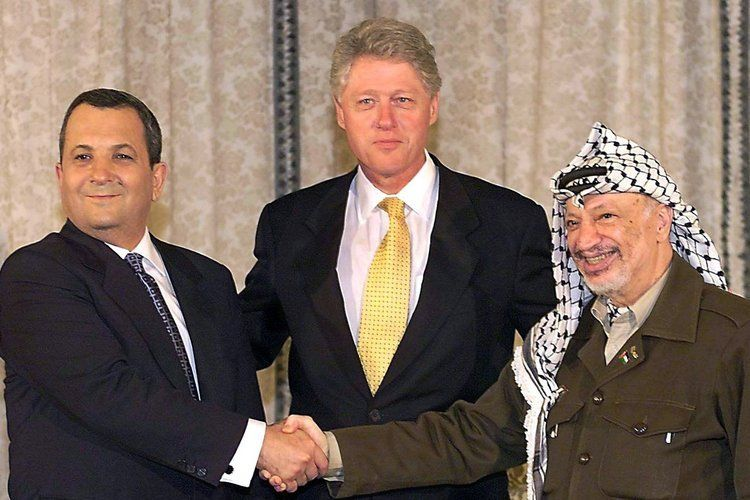
Just as telling for the Rabin legacy was the election of another Labor prime minister, Ehud Barak. Again, a former IDF Chief of Staff, ‘Mr. Security’, one who was ready to go for broke! Barak initiated Camp David 2000, where President Bill Clinton also hosted Arafat. Israel’s new leader adopted Rabin’s ‘separation’ approach and pushed it to the limit. Two states – Israel and Palestine on the West Bank and Gaza. Secure and recognized borders for Israel to include agreed land swaps. The partition of Jerusalem based on Clinton’s formula – what’s Jewish remains Jewish, what’s Arab remains Arab! A symbolic number of Palestinian refugees would be allowed to return to Israel, the rest would be settled in the new state of Palestine. This two-state solution would mark a historic end of the conflict with no further claims by either side.
Arafat knew the Palestinians would not accept Palestine, if it meant living alongside a secure Jewish state of Israel.
Clinton and negotiator Dennis Ross both applauded Barak’s acceptance of the deal. Israel’s leader had stepped up to the plate on a fair compromise. So how did Arafat respond to this momentous two-state solution? Did he say ‘Yes’, or ‘No’? He did neither; he just didn’t respond, but packed his bag, returned home, and launched the Second Intifada! Again, Arafat knew the Palestinians would not accept Palestine if it meant living alongside a secure Jewish state of Israel.
This syndrome is again repeated in the future. The International Quartet headed by U.S. President George Bush proposed the Roadmap peace plan in 2003. Even Prime Minister Ariel Sharon, the ultimate hawk this time, accepted it but on one condition: ‘If we’re going full steam ahead on the two-state solution, the Palestinians must halt the killing of Israelis along the way’. It may sound reasonable, but not to the Palestinians.
Moreover, when Sharon executed a unilateral withdrawal from the entire Gaza Strip, did the Palestinians seize the opportunity and call off terrorism? This would have been a step toward peace talks on a similar pullout from the West Bank. No, just the opposite – they turned Gaza into a launchpad for rocketing Israel.
In 2008 – enters President Mahmoud Abbas, a new Palestinian leader but the same old story. Israel’s Prime Minister Ehud Olmert warmed up the Barak and Rabin plans and offered them to Abbas. Again, the Palestinians refused to reply. Even Bibi imposed a ten-month moratorium on settlement building as an entre to peace talks. Again, the Palestinians were a no show.
What is to be concluded from all of this?
Let me broaden the landscape. How come Egypt, the strongest country in the Arab world, and Jordan, decided to make peace with Israel? Only after their leaders President Anwar Sadat and King Hussein realized they could not defeat Israel on the battlefield and the continuation of the conflict was costing them dearly. Those two statesmen had qualities of leadership to follow through to full peace. Unless and until the Palestinians have leaders of similar stature, there will be no peace.
Arafat sought the destruction of Israel through violence and terror – Abbas is trying to rally the international community into forcing Israel to accept an imposed solution; one that will not grant Israel secure and recognized borders, while also refusing to recognize Israel as the JEWISH state (which infers that the millions of descendants of the Palestinian refugees can continue their campaign to flood Israel out of existence).
But if this narrative is correct, why is it that Israel is being bashed and boycotted so much abroad? Although I believe the Jewish state to be far ‘more sinned against than sinning’, there is one major flaw that is exploited even by those academics, some of them even Jewish, who chastise Israel for not living up to their very high moral and intellectual standards. In most cases, standards they do not apply to their own countries such as the U.S. and Britain that come so quickly to mind. Israel’s flaw is the settlement building.
I cannot answer those who say it’s wrong to build on the West Bank land that is supposed to be part of a future Palestinian state. I agree, as do many other Israelis. It is everyone’s right, Jews included, to decide whether they want to support the Jewish state. Whether that means we should be boycotted, sanctioned, and weakened in other ways is a different question. It does seem a bit much with Hamas, Hezbollah, a potentially nuclear Iran, and now ISIL breathing down our necks these days.


